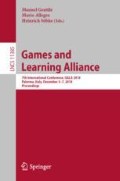Abstract
A learning path supporting the development of Computational Thinking skills in students of the last years of Primary School was defined and tested in a case study involving a grade 5 class and their teacher for the whole school year. The project aimed at involving all the students regardless of their personal interest, as a standard school activity. The case study proved to be successful with respect to students’ interest and their ability to reach the main project’s objectives. Their skills increased along the project and students demonstrated to be on the right path to develop a complete and autonomous approach to Computational Thinking. Nevertheless, a longer time span would be needed to for students to master deeply the new concepts and tools. Sometimes abstraction can be difficult and concrete activities are needed to introduce new ideas. Furthermore, students showed little autonomy and a limited use of the social aspects of the chosen programming environment. Devoting a longer time to the learning path would help fostering these skills. Finally, a close integration of the learning path with the school curriculum is envisaged.
Access this chapter
Tax calculation will be finalised at checkout
Purchases are for personal use only
References
Wing, J.M.: Computational thinking. Commun. ACM 49(3), 33–35 (2006)
Wing, J.: Research Notebook: Computational Thinking - What and Why? The Link. Carneige Mellon, Pittsburgh (2011)
PNSD: Piano Nazionale Scuola Digitale. http://www.istruzione.it/scuola_digitale/allegati/Materiali/pnsd-layout-30.10-WEB.pdf. Accessed 22 June 2018
Bocconi, S., Chioccariello, A., Dettori, G., Ferrari, A., Engelhardt, K.: Developing computational thinking in compulsory education – Implications for policy and practice; EUR 28295 EN (2016). https://doi.org/10.2791/792158
Bocconi, S., Chioccariello, A., Earp, J.: The Nordic approach to introducing Computational Thinking and programming in compulsory education. Report prepared for the Nordic@BETT2018 Steering Group (2018). https://doi.org/10.17471/54007
Román-González, M., Pérez-González, J.C., Jiménez-Fernández, C.: Which cognitive abilities underlie computational thinking? criterion validity of the computational thinking test. Comput. Hum. Behav. 72, 678–691 (2017)
Kafai, Y.B.: Connected gaming: an inclusive perspective for serious gaming. Int. J. Serious Games 4(3) (2017). https://doi.org/10.17083/ijsg.v4i3.174
Earp, J., Dagnino, F.M., Caponetto, I.: An Italian Pilot Experience in Game Making for Learning. In: Zhang, J., Yang, J., Chang, M., Chang, T. (eds) ICT in Education in Global Context, pp. 171–199. Springer, Singapore (2016). https://doi.org/10.1007/978-981-10-0373-8_9
Kafai, Y.B.: Playing and making games for learning: instructionist and constructionist perspectives for game studies. Games Cult. 1(1), 36–40 (2006)
Zaharija, G., Mladenović, S., Boljat, I.: Introducing basic programming concepts to elementary school children. Procedia Soc. Behav. Sci. 106, 1576–1584 (2013)
Bermingham, S., et al.: Approaches to collaborative game-making for fostering 21st century skills. In: European Conference on Games Based Learning, p. 45. Academic Conferences International Limited (2013)
Bottino, R.M., Ott, M., Tavella, M.: The impact of mind game playing on children’s reasoning abilities: reflections from an experience. In: Conolly, T., Stansfield, M. (eds) Proceedings of 2nd European Conference on Game-Based learning, Barcelona, Spain, pp. 51–57. Academic Publishing Ltd, Reading (2008)
Bottino, R.M., Ott, M.: Mind games, reasoning skills, and the primary school curriculum: hints from a field experiment. Learn. Media Technol. 31(4), 359–375 (2006)
Freina, L., Bottino, R., Ferlino, L., Tavella, M.: Training of spatial abilities with digital games: impact on mathematics performance of primary school students. In: Proceedings of the Game and Learning Alliance International Conference (GALA), Lisbon, Portugal, 5–7 December 2017
Freina, L., Bottino, R.: Visuospatial abilities training with digital games in a primary school. Int. J. Serious Games 5(3), 23–35 (2018)
Bottino, R.M., Chioccariello, A.: Computational thinking: videogames, educational robotics, and other powerful ideas to think with. KEYCIT - Key Competencies in Informatics and ICT, pp. 184–189. University of Potsdam, Potsdam (2014)
Resnick, M.: All I really need to know (about creative thinking) I learned (by studying how children learn) in kindergarten. In: Proceedings of the 6th ACM SIGCHI Conference on Creativity & Cognition, pp. 1–6. ACM (2007)
Resnick, M., et al.: Scratch: programming for all. Commun. ACM 52(11), 60–67 (2009)
Yin, R.K.: Case Study Research: Design and Methods. Sage, Thousands Oaks (2003)
Pea, R.D.: The social and technological dimensions of scaffolding and related theoretical concepts for learning, education, and human activity. J. Learn. Sci. 13(3), 423–451 (2004)
Author information
Authors and Affiliations
Corresponding author
Editor information
Editors and Affiliations
Rights and permissions
Copyright information
© 2019 Springer Nature Switzerland AG
About this paper
Cite this paper
Freina, L., Bottino, R., Ferlino, L. (2019). A Learning Path in Support of Computational Thinking in the Last Years of Primary School. In: Gentile, M., Allegra, M., Söbke, H. (eds) Games and Learning Alliance. GALA 2018. Lecture Notes in Computer Science(), vol 11385. Springer, Cham. https://doi.org/10.1007/978-3-030-11548-7_2
Download citation
DOI: https://doi.org/10.1007/978-3-030-11548-7_2
Published:
Publisher Name: Springer, Cham
Print ISBN: 978-3-030-11547-0
Online ISBN: 978-3-030-11548-7
eBook Packages: Computer ScienceComputer Science (R0)

